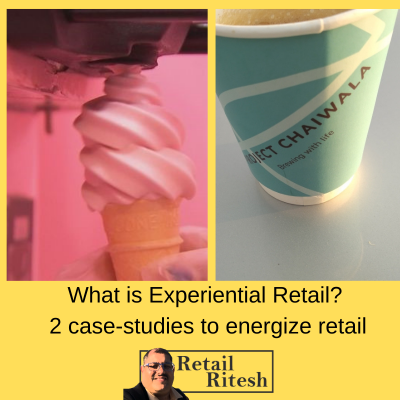What is Experiential Retail? 2 case studies to energize retail.
What is Experiential Retail?
Experiential retail is a type of retail marketing whereby customers coming into a physical retail space are being offered experiences beyond the traditional ones.
The physical store becomes the center of customer’s engagement, the brands are not selling here but are becoming advocators & taking a consultative approach towards creating a memorable experience that results in building trust for the customers.
In the recently concluded, the Middle East Retail forum, experiential retail was the trending topic.

The retail stalwarts came together for 2 days and brainstormed on the topics which are shaping our current retail concepts.
I have taken two brands i.e. Museum of Ice cream from New York and homegrown Project Chaiwala from the UAE.
Both these concepts embody the experiential retail in their brand’s salience.
What is the experiential retail engagement?
Experiential retail is a trend that is being practiced by the brands to create experiences over possessions, stories to tell over the product specs, create memories instead of selling products or services.
It is the new kind of retail marketing wherein building trust and engagement with the new customers’ i.e. Millennials are the priorities.
Case study 1: Museum of Icecream
The Museum of Ice Cream (MOIC), was co-founded in the summer of 2016 by Maryellis Bunn.
MOIC is an acronym for the “movement of imagination and creativity,” not the Museum of Ice Cream.
Since its start, the MOIC has approximately 394,000 followers on Instagram.
“Food is a language which we all understand,” says Bunn.
“When you have something as simple as ice cream, it’s something that’s spread happiness and brings people together in a way that’s unexpected.”
Store concept:
The concept of store color is Pink.

“For women…pink leads to happiness and good thoughts,” Bunn said, speaking about the soft millennial pink, the color that covers many walls of The Pint Shop.
It is a place wherein the women could come and connect with fellow friend and engage in sweet treats (ice creams) and create a memorable experience which is later shared on Instagram.
The brand encourages its customers to engage with the interiors of the store and share their experiences, it is a kind of pop-up retail revolution.
Start with your own pain point
When Bunn moved from calif to New York, she found that even in a city with more than eight million people, she felt lonely.
Insights:
“People are desperate for connection”.
“Everybody’s on their phones. Where do we have to go to connect?”
Bunn couldn’t find one, so she decided to create one with the Museum of Ice Cream. The pop-up, which Bunn referred to as a “passion project.”
But, the response was so overwhelming that the temporary museum moved to Los Angeles and Miami, and it’s currently in San Francisco.
Key Lessons from MOIC:
Experimental, physical, and sensory experiences that are seamlessly integrated with Instagrammable, social media-friendly moments are reinvigorating and redefining retail.
In other words, brick and mortar businesses are here to stay and are giving way to new, connective experiences.
Case Study 2: Project Chaiwala
During the Middle East retail forum, I met with Mr. Ahmed Kazim, co-founder of Project Chaiwala.
Ahmed along with his co-founder Justin Joseph saw a gap in the market especially for their love of traditional tea or chai (as it is famous in Southeast Asian countries).
The gap in the market:
To create an ambiance to showcase creativity in the tea business, in terms of brew, selection of finest leaves from foothills of Darjeeling, Assam.
Both wanted to create a concept that could bring creative, intellectual, artistic people together to enjoy a cup of finest chai in a traditional and more authentic way.
Hence Project Chaiwala was born.
They have created a simplistic and artistic ambiance in their store in al Serkal Avenue, al quoz, Dubai which is experiential.
Brand promise
Putting a smile on their customer’s face while providing them an ambiance which fulfills their creative urge while sipping the finest teas from the Indian sub-continent and providing them the experience which they relish back home i.e. authentic way of having tea.

Social responsibility:
Though the brand is new with 3 stores currently but the founders are following their corporate social responsibility from day one.
They source artisan’s matkas or popularly called Khullars (a type of cup made up of mud) from the rural villages in Tamil Nadu, India.
Thus ensuring they help protect the environment from plastic cups and in return, help uplift the rural artisans.
Result:
Today the brand caters to youth, especially females cutting across the geographies while enjoying a traditional cup of Karak chai. The brand serves various varieties of teas, herbal, Chinese, Japanese green teas and of course their famous signature chai shot.
What’s common between MOIC and Project Chaiwala?
Besides both being experiential retail concepts, there is a lesson to learn i.e. both the concepts are born from the pain-points experienced by their founders.
Hence I always say to my readers “Start a business and not a startup”.
Read my article on 4 tips to startup owners, click here.
To sum up my article, Mr. Ahmed Kazim, advises upcoming entrepreneurs, “Life is full of challenges and that’s the beauty of it, Keep hustling”.
This is a great statement that every entrepreneur should follow.
Read my article on Believe in yourself, click here.
About the author:
Ritesh Mohan is a passionate retail professional with over 20 years in the Retail sector, handling some of the biggest brands in beauty, fashion and fragrances retail & FMCG sector. He has been instrumental in the growth of some of the regional brands as well in the Middle East region. Ritesh specializes in Retail management, Product development, and Brand Management, Retail Operations, Sales Management and Franchising & Business Management. He strongly believes in empowering business owners with his wisdom & experience of around two decades in the industry.





